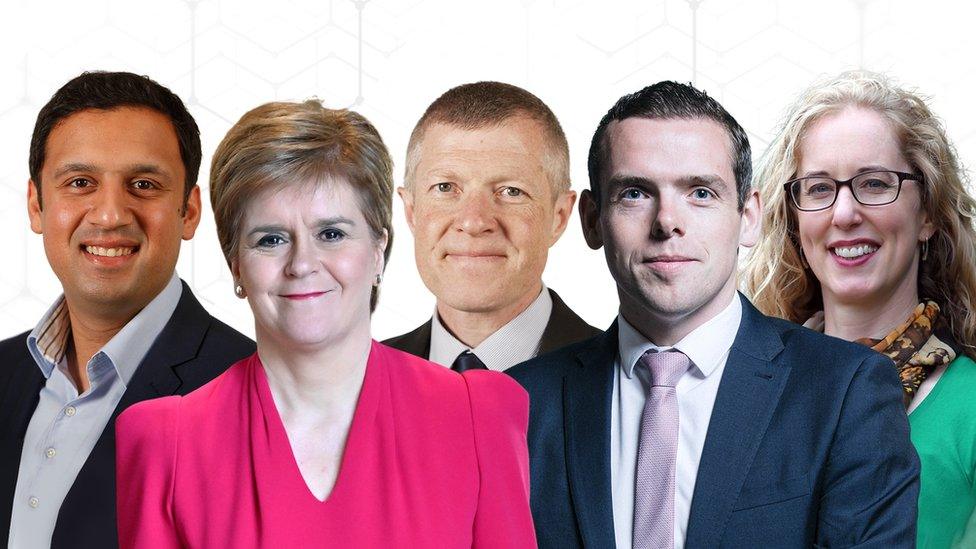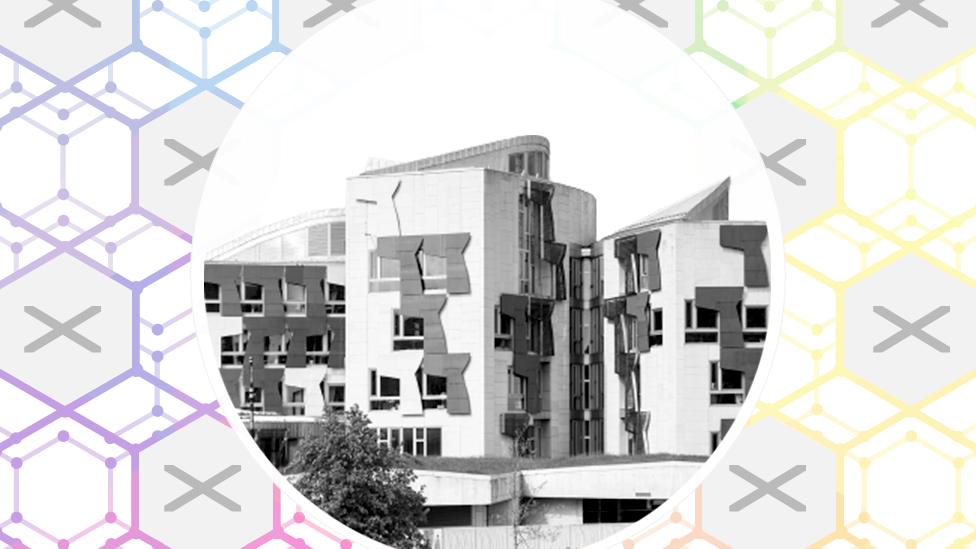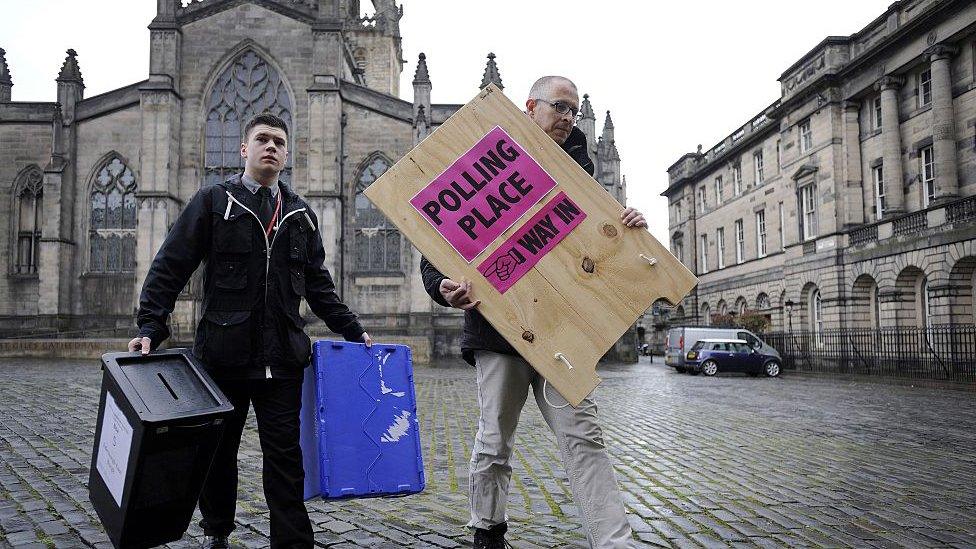Scotland election 2021: Leaders go head-to-head in first TV debate
- Published
- comments

Scottish Labour's Anas Sarwar; the SNP's Nicola Sturgeon; Scottish Lib Dem Willie Rennie; Scottish Conservative Douglas Ross and Scottish Green co-leader Lorna Slater all feature in Tuesday's broadcast
Scotland's political leaders are to face each other in the first TV debate of the Holyrood election campaign.
The SNP's Nicola Sturgeon, Tory Douglas Ross, Labour's Anas Sarwar, Green Lorna Slater and Lib Dem Willie Rennie will all take part in the BBC programme.
They will seek to set out their key policy pledges and arguments ahead of the Scottish Parliament vote on 6 May.
A further debate is to take place towards the end of the campaign.
What time is the leaders' debate?
Tuesday's programme will be on BBC One Scotland, starting at 19:50. It will run for an hour and 10 minutes and be moderated by the BBC's Scotland Editor Sarah Smith.
It can also be viewed on the BBC's News Channel and the iPlayer. It will be streamed live, with added analysis, on the BBC Scotland news website
Who is taking part?
Nicola Sturgeon - SNP leader - She set out the core principles of the SNP's platform in a campaign conference speech on Monday, saying the poll on 6 May was "perhaps the most important election in our country's history". The first minister said she could provide "strong, experienced leadership that the country needs at this time of crisis". And she said independence was central to her plans to rebuild Scotland post-pandemic.
Douglas Ross - Scottish Conservatives leader - He is putting opposition to independence at the heart of their campaign, saying that a new referendum would jeopardise the recovery from Covid-19. Mr Ross has said his party would set out a "positive plan for Scotland's recovery" - including the recruitment of more teachers and investment in infrastructure and economic growth - but said none of it could happen if the country was gripped by a fresh constitutional debate.
Anas Sarwar - Scottish Labour leader - Scottish Labour launched its campaign on Monday, with new leader Anas Sarwar saying the next term of parliament should be focused on recovery - with the health services first in line. Mr Sarwar unveiled plans for "life-saving" mental health workers in every GP practice in Scotland.
Lorna Slater - co-leader of the Scottish Greens - The Scottish Greens are basing their campaign on support for independence and a "green recovery from the pandemic". Ms Slater has said the party's manifesto will include plans for £7.5bn of investment in public transport, warm homes and renewable energy, creating 100,000 jobs.
Willie Rennie - Scottish Liberal Democrat leader - The Scottish Lib Dems say they would "put recovery first", arguing there should not be a fresh referendum "in the wake of a terrible pandemic". Mr Rennie said his plans included "cutting waits for mental health, delivering a bounce back plan for education, more jobs and action on the climate".
Why are leaders of smaller parties not taking part?
The BBC considers a number of factors when deciding who takes part in its TV election debates. One of those factors is based on previous and current electoral support. For example, the parties featuring in Tuesday's broadcast had MSPs elected to Holyrood in 2016. They also have elected representation in other chambers, such as local councils and at Westminster.
Ahead of an election the BBC issues a set of guidelines, which can be found here. They are general rules outlining how the broadcaster will cover things like day-to-day campaigning and debates. Although the leaders of smaller parties will not appear in this live television event there will be impartial and proportionate coverage of their campaigns in the coming weeks.
What should we look out for?

Nicola Sturgeon and Willie Rennie go into tonight's debate as the most experienced performers.
Mr Rennie has fronted Scottish Liberal Democrat campaigns for a decade, while Nicola Sturgeon has been SNP leader since 2014. Their challenge is to appear fresh when they are so familiar.
The others are appearing in this format for the first time.
Anas Sarwar has only had a month in charge. The Scottish Conservatives appointed Douglas Ross last summer.
While both have questioned Nicola Sturgeon at Holyrood, they have not yet been tested against her or each other on live TV.
Like the other newcomer - Lorna Slater - they have a big opportunity here to make an impact and energise their campaigns.
There is also danger for everyone in the line up. A low key performance or a gaffe could set back their election efforts.

SCOTLAND'S ELECTION: THE BASICS
What elections are happening? On 6 May, voters in Scotland will elect 129 Members of the Scottish Parliament (MSPs). The party that wins the most seats will form the Scottish government. Find out more here.
What powers does the Scottish Parliament have? MSPs pass laws on most aspects of daily life in Scotland, such as health, education and transport. They also have control over some taxes and benefits. Defence, foreign and immigration policies are decided by the UK Parliament.
How do I vote? Anyone who lives in Scotland and is registered to vote is eligible, so long as they are aged 16 or over on the day of the election. You can register to vote online, external.

Who will be in the audience?
Questions will come from members of the public who represent a range of different political opinions and demographics. However, because of Covid-19 restrictions they will attend virtually.
The audience is designed to reflect the broad range of political opinions on many of the issues affecting Scotland. That could be based on voting history, views on big issues like independence, as well as diversity of age, gender, social demographics and geographical location.
Who chooses the questions?
The production team ask audience members to submit questions and then choose the best and most representative of these - they'll ensure there is a range of political opinions among the questioners. The first time the panel hears each question is when the audience member asks it.
Throughout the programme, audience members are also given the opportunity to put further points to the panel.

POLICIES: Who should I vote for?
PODLITICAL: Updates from the campaign

- Published7 May 2021

- Published22 April 2021

- Published25 March 2021
